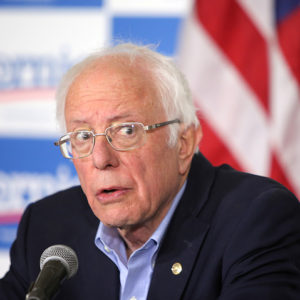Sen. Bernie Sanders, an independent from Vermont, has been talking a lot about the miracle drugs like Ozempic and Wegovy that people use to combat diabetes and obesity.
Oprah Winfrey recently did a prime-time special about the life-altering benefits of this class of medications. A doctor, a longtime critic of pharmaceutical companies, co-wrote an op-ed in the Wall Street Journal saying that this type of weight-loss drug is “worth the cost.”
Still, Sanders, who is chairman of the powerful Health, Education, Labor and Pensions Committee, put out a press release saying: “A new Yale study found that Ozempic costs less than $5 a month to manufacture. And yet, Novo Nordisk charges Americans nearly $1,000 a month for this drug, while the same exact product can be purchased for just $155 a month in Canada and just $59 in Germany. … I am calling on Novo Nordisk to lower the list price of Ozempic — and the related drug Wegovy — in America to no more than what they charge for this drug in Canada. The American people are sick and tired of paying, by far, the highest prices in the world for prescription drugs while the pharmaceutical industry enjoys huge profits.”
No one likes paying for expensive prescription drugs. Yes, pharmaceutical companies often rip people off. But, in this case, Sanders’ statement is misleading.
First, the cost of manufacturing a drug should not always be directly related to the price you pay for the medication. Why? Because the pharmaceutical industry makes massive investments in the development of medications. If a drug company spends billions of dollars creating a drug, then low manufacturing costs are not the only factor to consider when it comes to the overall price of the treatment.
Second, what drug companies charge versus what people pay are different matters. Most people pay less by getting their drug through insurers or other government-backed options — like the 340B program to help patients in rural hospitals access medicines — so the final dollar amount that comes out of their pocket is far less than $1,000 monthly.
Third, drug companies should be rewarded when their medications deliver life-altering results. Profit motivates drug companies to innovate and create products. However, this does not entitle those companies to never-ending profits, which is why we ensure their products eventually lose their patents, allowing people to buy a generic version. It’s not a perfect system, and some drug companies abuse the process to extend their patents. But, overall, it works.
What should Democrats talk about when it comes to drug prices?
We should remind people that President Biden has done much to reduce prescription medication prices. Specifically, the Inflation Reduction Act allows Medicare to negotiate drug prices with pharmaceutical companies and caps insulin prices at $35 monthly and out-of-pocket costs for drugs for Medicare beneficiaries at $2,000 yearly. The president achieved these objectives because he negotiated a deal with the most liberal and conservative Democrats in Congress.
It was the president’s political centrism that allowed him to achieve real benefits for Americans. Conversely, progressive leaders may chastise drug companies, but these legislators rarely pass laws to help people. Too often politicians on the far left and the far right put media attention and ideological purity over pragmatism and compromise. But, it’s the lawmakers — like President Biden — who make deals that achieve results for their constituents.
As a Democrat who won elections in a GOP-leaning district, I found that the key to my successes with moderate and swing voters was to avoid extreme rhetoric and focus on explaining how my policy accomplishments helped improve their lives.
Joe Biden and Democrats have a track record of reducing drug prices; let’s prioritize telling that story to voters between now and November.


